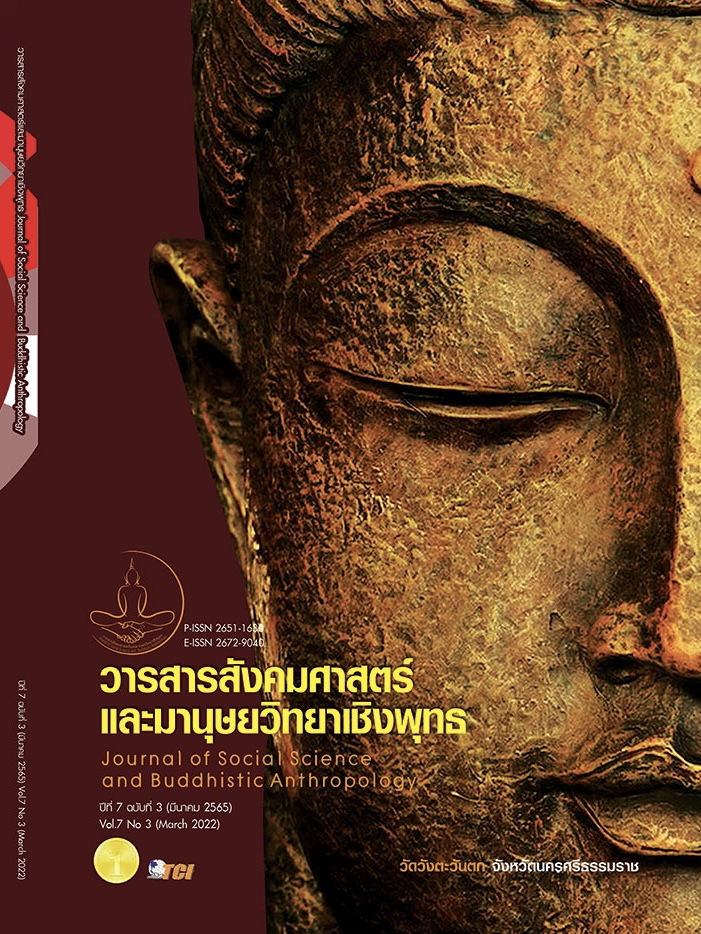THE DEVELOPMENT OF A SELF-MANAGEMENT BY THE KING'S PHILOSOPHY TO ENHANCE THE HAPPINESS OF FARMERS IN THE LOWER CENTRAL PROVINCIAL CLUSTER 1
Keywords:
Pattern, Self-management, Strengthening, The King's Philosophy, The Happiness of FarmersAbstract
The objectives of this research article were: 1) to study basic information, factors, and situations. The sample group consisted of 200 farmers in 5 communities, 4 provinces. Selected by simple random sampling. The tools were questionnaires, key informants on farmers in the community, including Ban Hua Ao Community, Sampran District, Nakhon Pathom Province, Ban Saphan Dam Community, Wat Kaew Subdistrict, Bang Phae District, Ratchaburi Province, Natural Farming Community, Tha Makham, Mueang District, Kanchanaburi Province, Wang Wa Subdistrict Organic Agriculture Community Si Prachan District, Suphanburi Province and Plak Mai Lai Community, Thung Khwang Subdistrict, Kamphaeng Saen District Nakhon Pathom Province. 20 people selected by specific method, tool, interview form. Data analysis by content analysis. found that, is a practice that has a unique process Taking into account the geographical, economic and social context of each area Solve problems holistically. 2) To develop a model, it was found that the development of self-management model using royal science to enhance well-being is the “5'S Model” consisting of self-development, self-reliance, social economics, satisfaction and sustainable, 5 people. 3) Using the model, it was found that the trainees had an average score before training was 10.72 and the mean score after training was 15.17. From the statistical test by testing the value, it was found that the knowledge score after training was higher than the score. The knowledge before training was statistically significant at the .05 level. The population from Wat Samrong community consisted of 30 people. 4) Evaluate and improve the self-management model using the King's science. of farmers in the lower central region 1 as a whole is at a high level. It is a mixed research method.
References
กัญญารัตน์ กิ่งก่ำ. (2555). ปัจจัยที่เอื้อต่อความสำเร็จในการพัฒนาชุมชนตามแนวทางปรัชญาเศรษฐกิจพอเพียงของชุมชนบ้านม่องหินแก้ว ตำบลวังพร้าว อำเภอเกาะคา จังหวัดลำปาง. ใน วิทยานิพนธ์รัฐประศาสนศาสตรมหาบัณฑิต สาขาวิชารัฐประศาสนศาสตร์. มหาวิทยาลัยเชียงใหม่.
กาญจนา คุ้มทรัพย์. (2558). การจัดการป่าชุมชนท้องถิ่นอย่างยั่งยืน กรณีศึกษาป่าชุมชนบ้านดอนหมู จังหวัดอุบลราชธานี. ใน ดุษฎีนิพนธ์ปรัชญาดุษฎีบัณฑิต สาขาวิชาพัฒนบูรณาการศาสตร์. มหาวิทยาลัยอุบลราชธานี.
โกวิทย์ พวงงาม. (2553). การจัดการตนเองของชุมชน. กรุงเทพมหานคร: เอ็กเปอเน็ต.
ทรงชัย ติยานนท์. (2542). การศึกษาทัศนะของเกษตรกรในการสร้างความมั่นคงทางรายได้ ตามแนวคิดเศรษฐกิจพอเพียง. ใน วิทยานิพนธ์สังคมสงเคราะห์ศาสตรมหาบัณฑิต สาขาวิชาการบริหารและนโยบายสวัสดิการสังคม. มหาวิทยาลัยธรรมศาสตร์.
ทิวเมฆ นาวาบุญนิยม. (2558). การประยุกต์ใช้ปรัชญาของเศรษฐกิจพอเพียงเพื่อพัฒนาคุณภาพชีวิตของชุมชน. ใน วิทยานิพนธ์บริหารธุรกิจมหาบัณฑิต สาขาวิชาการจัดการทั่วไป. มหาวิทยาลัยราชภัฏนครปฐม ปฐมอโศก.
พัชราภา สิงห์ธนสาร. (2560). ปัจจัยที่มีผลต่อการพัฒนาเศรษฐกิจชุมชน เขตตำบลแม่วงก์ อำเภอแม่วงก์ จังหวัดนครสวรรค์. วารสารดุษฎีบัณฑิตทางสังคมศาสตร์, 1(7), 57-69.
ภคพนธ์ ศาลาทอง. (2562). เรื่องเล่าจากรวงข้าว : วิถีชีวิต วิถีการทำนา...สู่การพัฒนาการพึ่งตนเอง. (พิมพ์ครั้งที่ 1). กรุงเทพมหานคร: บริษัท โอ.เอส.พริ้นติ้ง เฮ้าส์ จำกัด.
มูลนิธิชัยพัฒนา. (2542). เศรษฐกิจพอเพียง. เรียกใช้เมื่อ 20 มกราคม 2558 จาก https://www.chaipat.or.th/site_content/item/3579-2010-10-08-05-24-39.html
วงษ์ศิริ เรืองศรี. (2553). การจัดการตนเองของชุมชนในการจัดการป่าพรุคันธุลีตามหลักอริยสัจ. วารสารมหาจุฬานาครทรรศน์, 6(10), 5481-5497.
วรวุฒิ อินทนนท์. (2556). สถาบันการเรียนรู้เพื่อปวงชน ปฏิบัติการในชีวิตประจำวันของชุมชนกับความเป็นสาธารณะ. ใน ดุษฎีนิพนธ์ปริญญารัฐประศาสนศาสตรดุษฎีบัณฑิต สาขารัฐประศาสนศาสตร์. มหาวิทยาลัยอุบลราชธานี.
ศิริณา จิตต์จรัส. (2560). ศาสตร์พระราชากับการพัฒนาการบริหารการศึกษาอย่างยั่งยืน. วารสารศึกษาศาสตร์ มหาวิทยาลัยศิลปากร, 18(2), 21-42.
สุเทพ พันประสิทธิ์. (2558). การศึกษาการขยายผลทางเศรษฐกิจของชุมชนบนพื้นฐานแนวคิดเศรษฐกิจพอเพียง อำเภอวิหารแดง จังหวัดสระบุรี. ใน รายงานการวิจัย. ศูนย์วิจัยคณะเศรษฐศาสตร์.
Downloads
Published
How to Cite
Issue
Section
License
Copyright (c) 2022 Journal of Social Science and Buddhistic Anthropology

This work is licensed under a Creative Commons Attribution-NonCommercial-NoDerivatives 4.0 International License.









